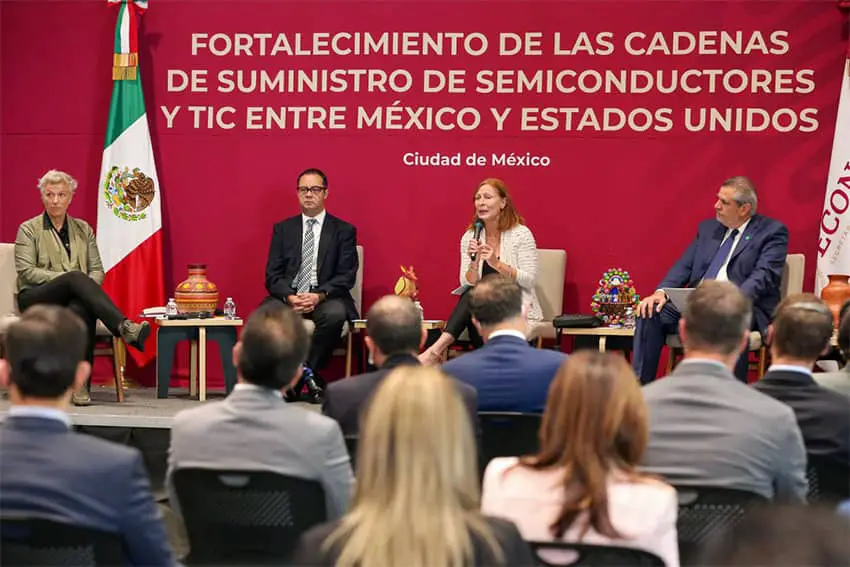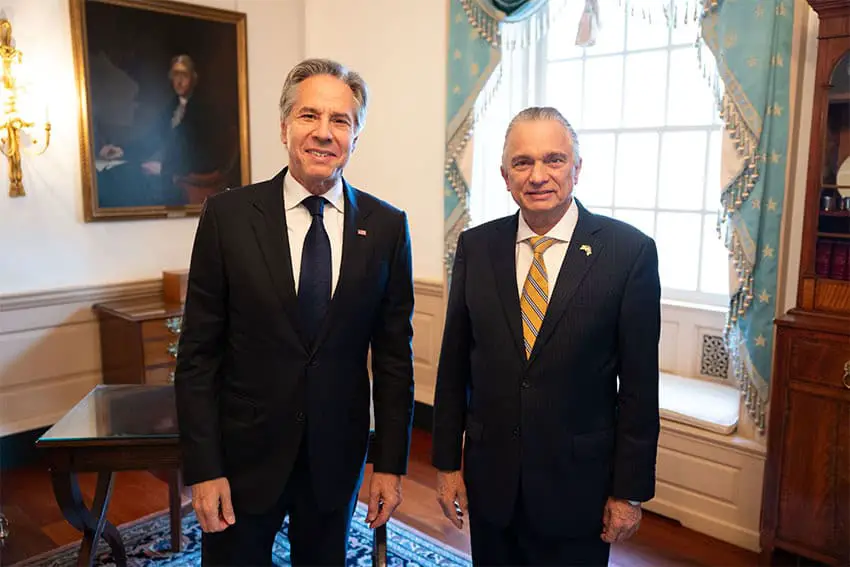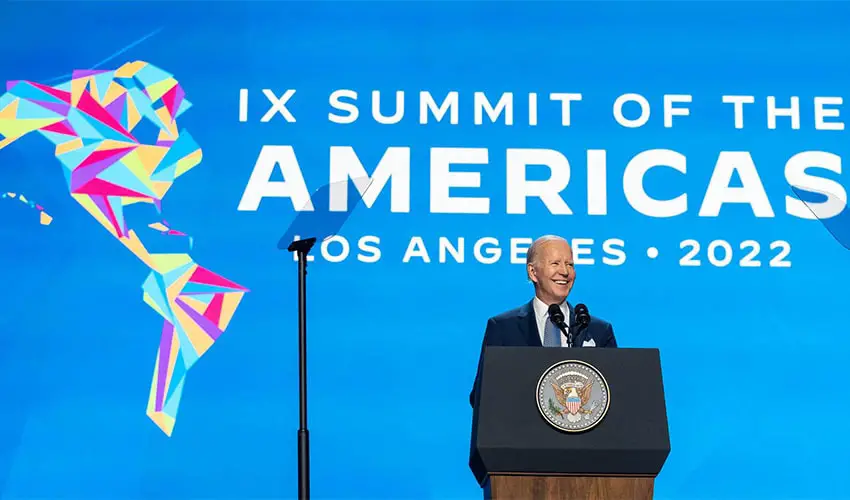Mexico already has a semiconductor partnership with the United States, and the country is now part of a regional semiconductor industry initiative that U.S. Secretary of State Antony Blinken says will “turbocharge” its capacity to assemble, test and package the critical electronic components.
In his opening remarks at a meeting in Washington, D.C., on Wednesday attended by officials from the 12 member countries forming the Americas Partnership for Economic Prosperity, Blinken announced the creation of the Western Hemisphere Semiconductor Initiative.

“Thanks to funding from the bipartisan CHIPS Act, this initiative will turbocharge countries’ capacity to assemble, to test, and to package semiconductors, beginning with Mexico, Panama and Costa Rica,” he said.
Blinken also said that the United States will hold a semiconductors symposium in Mexico in September “to identify ways that the region can play a larger role in the global supply chain for this critical technology.”
Semiconductors: A key component in electronic devices
Asian countries such as Taiwan, South Korea and China are the main manufacturers of semiconductors, essential components in smartphones, computers, drones, electric vehicles and medical devices.
The United States wants to reduce its reliance on semiconductors from Asia by investing heavily in its own semiconductor industry. Its plan is to assist other countries in the region in increasing their capacity in the sector.
The U.S. Department of State announced in March that it would partner with the Mexican government to “explore opportunities to grow and diversify the global semiconductor ecosystem” under the five-year US $500 million International Technology Security and Innovation (ITSI) fund, part of the CHIPS Act of 2022.
The Western Hemisphere Semiconductor Initiative
The U.S. Department of State (DOS) released a statement on the regional initiative.
.@SecBlinken: A través de la Alianza de las Américas, impulsamos inversiones y empleos de alta calidad en el hemisferio. Junto al sector privado y sociedad civil, estamos comprometidos con un crecimiento económico inclusivo para una región más próspera, democrática y segura. pic.twitter.com/i6R0MXS3yK
— USA en Español (@USAenEspanol) July 18, 2024
In Blinken’s speech to Americas Partnership members, excerpted here, he emphasized the benefits of the member nations working as a unit.
“Today, to bolster semiconductor production capabilities across the Western Hemisphere, the U.S. Department of State, in collaboration with the Inter-American Development Bank (IDB), has unveiled the CHIPS ITSI Western Hemisphere Semiconductor Initiative,” the DOS said.
The department described the initiative as “groundbreaking” and noted, as Blinken did, that it will enhance “semiconductor assembly, testing, and packaging (ATP) capabilities in key partner countries, beginning with Mexico, Panama, and Costa Rica.”
The DOS said that the IDB “will support public-private partnerships and implementation of OECD recommendations tailored to enhance the semiconductor ecosystems in targeted countries.”
It said that the initiative will commence in 2024 and run through 2026.
“This initiative will strengthen regional capabilities and set a precedent for inclusive economic growth and global technological advancement,” the DOS said.
Reaction to the initiative
“Mexico will be king of semiconductors,” asserted a headline in a Publimetro article that struck an optimistic tone about the new regional initiative.
Writing in the El Financiero newspaper, columnist Jeanette Leyva Reus was also optimistic about the announcement, asserting that “there is every appearance” that a “new stage” in the construction of semiconductor plants is coming.
Mexico will receive semiconductor sector investment without even asking for it, she wrote.
Gabriela Siller, director of economic analysis at Mexico’s Banco Base, said on X that if the new semiconductor initiative comes to fruition, “it will bring a lot of foreign investment to Mexico.”
“Of course, electricity, water and highway infrastructure needs to be improved,” she added.

China experts weigh in
Paul Triolo, partner for China and technology policy lead at global business strategy firm Albright Stonebridge Group, was far less upbeat about the potential benefits the initiative will bring to Mexico and other Western Hemisphere countries.
The South China Morning Post, which spoke to the Washington D.C.-based executive, reported that Triolo “was skeptical about how easy it would be to implement the plans announced by US officials.”
He told the Hong Kong-based newspaper that the Western Hemisphere Semiconductor Initiative would likely focus on the packaging and testing of semiconductors, but not on front-end manufacturing — i.e. the creation and processing of the semiconductor wafer.
“No major … firms are likely to want to establish a presence in these countries,” Triolo said in reference to Mexico, Panama and Costa Rica.
Even in the United States, “major front-end manufacturing firms that have received funding under the CHIPS Act are struggling to build advanced … facilities,” he told The South China Morning Post, explaining that the main impediment is the shortage of skilled workers to build and operate the plants.
Triolo said that even building a significant semiconductor packaging ecosystem in Mexico, Panama and Costa Rica could be “very challenging given the scale of investment required, unclear sources of trained personnel and [doubts about] the long-term ability of the U.S. to support such an effort.”

China’s state-owned newspaper reacts
The Global Times, a state-owned Chinese newspaper considered a Chinese Communist Party mouthpiece, also weighed in on the Western Hemisphere Semiconductor Initiative. Its report said the program “may be just ‘lip service’ from the U.S.”
“The Western Hemisphere Semiconductor Initiative comes as Washington tries to reignite the flame of semiconductor manufacturing in the U.S. The government is flexing all policy muscles to boost domestic semiconductor manufacturing by suppressing its competitors. So, it is almost impossible for the U.S. to give full support to other countries’ efforts in advancing semiconductor manufacturing,” the report said.
“… Although the U.S. may bring Latin American countries some small-scale investment in back-end semiconductor manufacturing, we don’t think it will be very helpful in boosting the development of manufacturing in Latin American countries,” The Global Times said.
Launched by United States President Joe Biden in 2022, the Americas Partnership for Economic Prosperity — from which the new semiconductor initiative stems — is seen as a U.S. effort to counter growing Chinese influence in Latin America. It includes the United States, Canada, Mexico, Chile, Colombia, Barbados, Costa Rica, the Dominican Republic, Ecuador, Panama, Peru and Uruguay.
Upcoming semiconductors symposium in Mexico
The opportunities arising from the Western Hemisphere Semiconductor Initiative and Mexico’s bilateral semiconductor partnership with the United States are on the agenda for the Americas Partnership Semiconductor Symposium, which will be hosted by the U.S. Department of State and Mexico’s Economy Ministry in Mexico City on Sept. 5 and 6.
The challenges that must be overcome to ensure success will also be on the agenda.

The DOS said in a statement that the symposium “will focus on expanding and diversifying the semiconductor assembly, testing, and packaging (ATP) ecosystem in Americas Partnership countries.”
“A secure semiconductor supply chain ecosystem in the Western Hemisphere is critical to the Biden Administration’s goals, including the successful implementation of the CHIPS Act,” the department added.
It said that the symposium will “bring together industry, particularly small and medium-sized suppliers, governments, academia, and labor to identify key challenges, explore emerging opportunities, and develop strategies for sustainable growth and collaboration in this critical industry.”
“These efforts will work towards achieving one of the Americas Partnership’s priority goals of bolstering the semiconductor industry and capacity in the Western Hemisphere,” the DOS said.
Mexico News Daily
